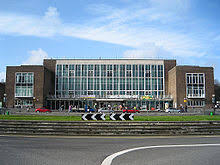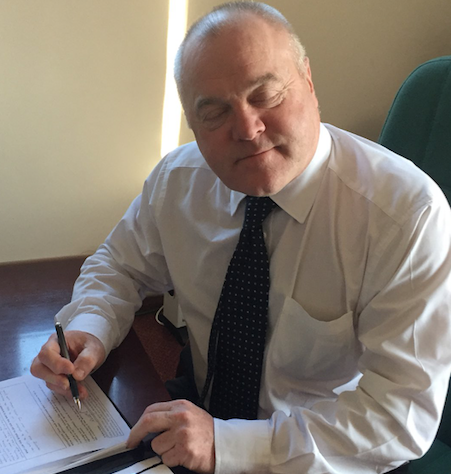- ‘Lies, damned lies etc…’ - 13th February 2026
- Missing in action - 12th February 2026
- Travel news again - 11th February 2026

Revelations in the UK media that a major Welsh health authority is using new technology to speed up treatment, have highlighted past controversies involving the board, including being under scrutiny during an investigation into a multi-million pound land deal.
The Times has reported: “In Wales, Hywel Dda hospital has seen a 35 per cent reduction in the number of beds filled with patients who are medically fit to go home after introducing Faculty’s Frontier AI tool that predicts discharge dates”.

There are actually a number of hospitals in the area served by the Hywel Dda University Health Board (HDUHB), and health policy is devolved, but other facts may be more troubling than this apparent error.
The board was part of a huge investigation, which followed creation of the £200 million ‘Llanelli Wellness and Life Science Village’ (Delta Lakes) project, rebranded as ‘Pentre Awel – Breezy/Windy Village’.

It formed part of the £1.3 billion Swansea Bay City Region Deal (SBCRD), and was run in partnership with Swansea University (SU) as well as the Hywel Dda and Abertawe Bro Morgannwg health boards – 86 acres of land at Delta Lakes had planning permission, and the giant venture was to have included research and business development facilities, a state-of-the-art care home as well as an assisted living and rehabilitation centre, outdoor leisure space, a wellness hotel, and a new leisure centre.
Following a police inquiry beginning into it (which resulted in no action), a statement from SU declared: “The police have confirmed to Swansea University that there was evidence of potential criminal offending identified and secured against individuals and companies subject to their enquiry…

“The university’s decision to dismiss Marc Clement (the driving force behind the enormous scheme) was based on serious breaches of Swansea University procedures and was never dependent on a criminal investigation by the police or decision to prosecute by the CPS (Crown Prosecution Service)“.
During the police investigation, properties in Swansea, Carmarthenshire and Kent were searched.

South Wales Police (SWP) said the Regional Organised Crime Unit (Tarian) executed “a number of warrants as part of an investigation into alleged bribery offences. Seven (then eight) addresses in Swansea, Carmarthenshire, and Kent are being searched with the assistance ofcolleagues”.
The searches involved officers from South Wales, Dyfed Powys and Kent Police forces, yet The Eye were alone in disclosing the properties raided by the police.


Another statement from SU made plain that other senior officials were also included in the probe which involved HDUHB.
It stated baldly: “In September 2018, the University investigated a payment that had been made to Raymond Ciborowski (the University’s former Registrar) upon the termination of his employment.
“This investigation found that the agreement governing the termination of Raymond Ciborowski’s employment as Registrar contained irregular and inappropriate provisions”, and continued: “… gains included salaries from future appointments and equity potentially worth millions of pounds. The evidence suggested that there were material and serious interests that should have been declared under the University’s policies and procedures”.

An announcement from SU’s ‘Associate Director Vice-Chancellor’s Office, Head of Legal and Compliance Services’ proclaimed: “The matters under investigation are very serious.
“The University has invested a significant amount of resource investigating the alleged misconduct, as have the authorities. It is essential that nothing is done to undermine the on-going processes”.

But it hasn’t just been the periphery role of HDUB which has been looked into – the questionable past of Professor Clement was also examined.
He started Skin Logistics (SL) which was looking for £1.2 million to expand as well as launch, and was at one point funded by a substantial loan from the Development Bank of Wales (DBW) owned by the Welsh Government (WG).
From our research it is clear that officials elsewhere have been conscious of possible jeopardy.

Professor Clement was in charge of the University of Wales/Prifysgol Cymru (UoW/PC), and internal papers from his time at the helm showed that board members were alerted: “to a request from (crooked academic) Steven Chan… to transfer $295,500 (£190,640) to three separate programs at the Massachusetts Institute of Technology (MIT)”.
But that: “Council are asked to note the potential financial, political and reputational risks surrounding the project”, and the papers also state: “xxx was invited to take part in a telephone call on 7 Sep 2012 with Marc Clements and Steve Chan (both in Boston)”.

Along with: “Reports were provided to Steve Chan who was designated by then President Marc Clement as his representative…”.
Now it’s a different kind of report, which The Eye have been able to use to highlight all of this – that a Welsh health board is using new technology.
Professor Clement would be so proud. Not.

Our Editor Phil Parry’s memories of his extraordinary decades long award-winning career in journalism (including highlighting facts others would rather forget) as he was gripped by the incurable disabling condition Hereditary Spastic Paraplegia (HSP), have been released in a major new book ‘A GOOD STORY’. Order it now!
Regrettably publication of another book, was refused, because it was to have included names.
 Tomorrow – how a tiny Welsh local authority decided merely to “censure” a nationalist council member after he posted a picture of himself brandishing a gun on a beach declaring that he was keeping out English people which made headlines across the UK, with it coming more than a YEAR AND A HALF after The Eye first revealed the controversial incident.
Tomorrow – how a tiny Welsh local authority decided merely to “censure” a nationalist council member after he posted a picture of himself brandishing a gun on a beach declaring that he was keeping out English people which made headlines across the UK, with it coming more than a YEAR AND A HALF after The Eye first revealed the controversial incident.









